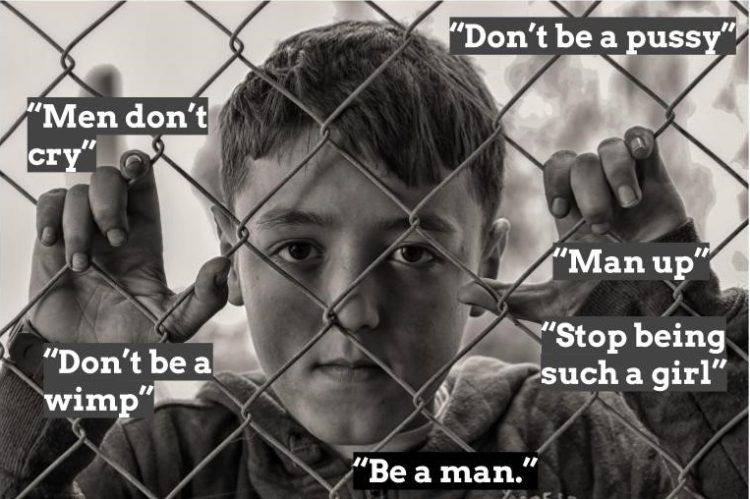This articles about accepting and loving your body was the first personal question I answered in the old Frank Answers, in May 2020, because I thought it is an issue we all need to come to terms with in our body-obsessed culture that is fueled by body shame inflicted on us by others, not least our religion.
Question: I see your articles as preaching embodiment. I see Jesus’ teachings as claiming our vitality vs. much of the Church’s teachings (vis-a-vis the zealot Paul) of the body as the thorn in the flesh. Evangelical shame and disembodiment in my youth led to numbness and PTSD. How do you suggest I heal and reclaim embodied living now in my middle-aged years?
Frank answers: As a middle-aged man raised in an evangelical church you may have grown up in the 1990s when Promise Keepers was going strong in evangelicalism with its promotion of “manly men” who showed no weakness, demonstrated an emotional stoicism, always held their feelings to themselves, and sucked up whatever wild pitches life threw at them. Evangelicals with a “focus on the family” stressed that men were the heads of their families. Gay liberation was seen as a threat to the family and to manly men generally. This ran the danger of promoting a toxic masculinity in relations with women and avoided male intimacy with other men out of fear of being perceived as gay. “Iron John” was actually homophobic — afraid of men. Young men and boys were under pressure to meet the standards of being a “manly man.” It didn’t help that TV advertising was also promoting manly men that few of us could approximate. You may have been a casualty of this promotion of “Christian masculinity.” (The 1990s movement was a replay of the “Muscular Christianity” of the late 19th/early 20th centuries, although without its more progressive social agenda.)

By way of addressing your issue, let me sort out a couple of issues, make some referrals, and offer some suggestions.
First, “embodiment” has become a concept with various meanings. I take it to mean experiencing something in the body. For example, I wrote a book on Embodied Liturgy. By that I meant experiencing public worship in the body and engaging in it bodily. Embodiment has to do with taking into your body the experiences of life, social norms, cultural practices, etc. These can be positive or negative. They can shape your behavior. For example, do you always have to be “proving” your masculinity in the light of what a “manly man” should be like?
Second, I will not quibble over how you see Jesus and St. Paul. I will note that Jesus called all people into abundant life under the reign of God and Paul extended this call of the crucified and risen Lord Jesus, the Christ (Messiah) of Israel, to the Gentiles. Paul’s worldview is a tough nut to crack since he was simultaneously a Pharisaic Jew, a Roman citizen, and an inhabitant of the Hellenistic cultural world who wrote in common (koine) Greek. He had a new reality to proclaim within and over against all these cultures. His emphasis was not on what Jesus taught but what Jesus did in his body (cross and resurrection) for the salvation of the world.
Paul did not have a negative view of the body (soma) but of what desires of the flesh (sarx) do to make our body “a body of death” (Romans 7:25). Our “body of death” needs resurrection of the body. Paul’s “thorn in the flesh” was not a body issue but a spiritual issue. The extent to which Paul was influenced by the stoics, with their dim view of the passions of the flesh (desires), has been discussed by many scholars. But hope in the resurrection of the body comes right out of Paul’s experience of the risen Christ. Paul was all about the body — the weak body and the strong body, the afflicted body and the triumphant body, the suffering body and the glorious body, the sacramental body and the communal body. In all these manifestations of body we participate in the body of Christ.
Third, I recommended the book by Aaron Frost, Christian Body: Modesty and the Bible (self-published, but available on Amazon.com). Aaron comes out of an Evangelical background (Baptist) and understands the evangelical Christian mindset about nudity and modesty. He argues that Evangelical views on these issues owe more to Victorian prudery than to the Bible. There is nothing in the Bible that condemns nudity. Christ himself, in his atoning act on the cross for our forgiveness and salvation, was naked (no loincloth!) and without shame, except that he took our shame upon himself. In modern times, there has been a strong movement of Christian naturism.

Christian attitudes about the body should be distinguished from Christian attitudes about sex. For a study on ancient Christian attitudes toward sex see Peter Brown, The Body and Society: Men, Women, and Sexual Renunciation in Early Christianity (New York: Columbia University Press, 1988; revised with a New Introduction 2008). It documents how deeply Greek Neo-Platonism affected ancient Christian negative views about sexuality from St. Paul to St. Augustine of Hippo and into the Middle Ages. The Protestant reformers rejected the medieval preference for celibacy over marriage and viewed sex as a gift from God. The Protestant reformers all championed marriage and family and saw it as a center of spirituality.
With regard to your personal issues, numbness and PTSD (if this is a professional diagnosis) suggests that you experienced some trauma that resides in your body. Such traumas include but are not limited to accidents, diseases, physical, mental, or sexual abuse. This could be compounded by negative teachings about the body and sexuality in your church. Many men who “come out” as gay are ill-treated by their church and even alienated from their families. Realizing this possibility, some suppress their sexuality. But suppression of that sexual desire eats away at them and lingers in the body and can cause toxic behavior. Men need to find pleasure as well as satisfaction in their bodies.
It is possible that you suppressed your bodily self and your sexuality in reaction to images of masculinity you did not model. I would suggest that you practice a positive embodiment by engaging in activities that keep you present to your body. These might be physical activities such as workouts, running, swimming, yoga, etc. Just walking shirtless in a natural area on a nice day and feeling a connection with nature can be very therapeutic. Identifying with the natural world reinforces your belief that your body is not something to be ashamed of. It’s part of the natural world that God created. Accept it as it is and work on keeping it healthy by exercise and diet. Through these practices you show love toward your body and learn to love it.

I recommend reading the work of Dutch psychiatrist Bessel van der Kolk, The Body Keeps the Score: Brain, Mind, and Body in the Healing of Trauma (New York: Viking, 2014). Van der Kolk has contributed to the recently developed practice of somatic psychotherapy, which is a holistic treatment of trauma that looks for the impact of trauma on the body and the need to discern what the body has to say about current psychological issues. Most of the therapists are licensed clinical social workers with additional certification in somatic psychotherapy. If the traumas your body have a negative impact on your life and attitude, you might want to seek out such a clinical practitioner who can help you become more attuned to what you have embodied from your life experiences and work with you on overcoming those negative experiences.
Finally, it may be important for you to love your bodily self to the extent that you don’t mind sharing your bodily experiences and attitudes with others, for example, in a group that focuses on issues of body and sexuality. Many of the men who participate in such workshops or retreats are in the middle age bracket. Yoga retreats and workshops may offer such gatherings. If you find something by looking online, you can always call the organization and press for more information about what their retreats or workshops will be like. Maybe on the “Meet Up” app you might find a men’s discussion group that meets regularly. I wish you the best as you seek and experience healing.
Pastor Frank

Explore Masculine Maturity and Purpose
In this retreat, like-minded men will have the opportunity to come together as brothers to reflect on their journey into manhood, share their own stories, and be heard in a safe and non-judgmental space.






Anders writes:
Thank you for your helpful feedback!
MAY 27, 2020